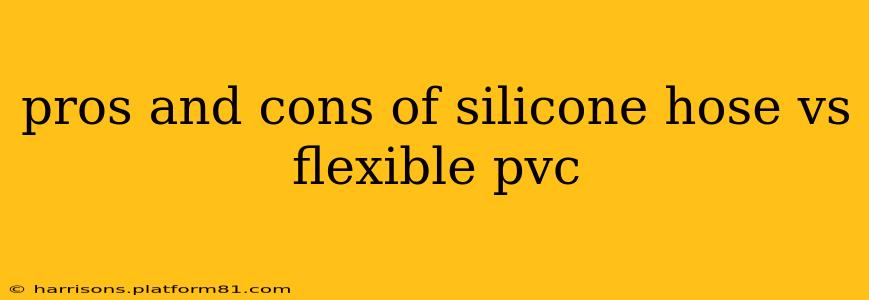Choosing the right hose for your application depends heavily on the specific demands of the job. Silicone and flexible PVC hoses both offer flexibility, but their properties differ significantly, leading to distinct advantages and disadvantages. This comparison will delve into the key differences to help you make an informed decision.
What are Silicone Hoses Used For?
Silicone hoses excel in high-temperature applications and situations requiring excellent resistance to chemicals and weathering. Common uses include automotive applications (boost hoses, coolant hoses), industrial processes (chemical transfer), and food and beverage industries (where FDA-compliant silicone is crucial). Their flexibility allows for easy installation and maneuverability in tight spaces.
What are Flexible PVC Hoses Used For?
Flexible PVC hoses are a versatile and cost-effective option suited for a wide array of applications where temperature and chemical resistance aren't paramount concerns. Typical uses include water transfer, air lines, and general-purpose applications in various industries. Their affordability and ease of availability make them a popular choice for less demanding tasks.
Silicone Hose: Pros and Cons
Pros:
- High Temperature Resistance: Silicone hoses can withstand significantly higher temperatures than PVC hoses, making them ideal for hot liquids or gases.
- Excellent Chemical Resistance: They are resistant to a broader range of chemicals and solvents than PVC.
- Flexibility and Durability: Silicone hoses are flexible and durable, able to withstand repeated bending and flexing without cracking or breaking.
- UV Resistance: They generally exhibit superior resistance to ultraviolet (UV) light degradation compared to PVC.
- Food-Grade Options Available: FDA-compliant silicone hoses are available, suitable for food and beverage applications.
Cons:
- Higher Cost: Silicone hoses are generally more expensive than PVC hoses.
- Permeability to Gases: While resistant to many liquids, some silicone hoses can be permeable to certain gases.
- Less Abrasion Resistance: Compared to some other hose materials, silicone can be more susceptible to abrasion.
- Not Suitable for All Applications: While flexible, their flexibility might not be as extreme as some specialized PVC hoses.
Flexible PVC Hose: Pros and Cons
Pros:
- Low Cost: PVC hoses are significantly cheaper than silicone hoses.
- Widely Available: They are readily available from most hardware stores and industrial suppliers.
- Good Flexibility: PVC hoses offer sufficient flexibility for many general-purpose applications.
- Lightweight: They are lighter than silicone hoses, making them easier to handle and install.
Cons:
- Limited Temperature Resistance: PVC hoses cannot withstand high temperatures and can become brittle or melt at elevated temperatures.
- Lower Chemical Resistance: They are less resistant to chemicals and solvents than silicone.
- Susceptible to UV Degradation: Prolonged exposure to UV light can cause PVC hoses to degrade and become brittle.
- Not Food-Safe (Generally): Standard PVC hoses are not typically food-safe.
Which Hose is Right for You?
The best hose choice depends entirely on your specific needs. Consider the following factors:
- Temperature: Will the hose be exposed to high temperatures? If so, silicone is necessary.
- Chemicals: What chemicals will the hose come into contact with? Silicone offers better resistance.
- Application: General-purpose applications often favor cost-effective PVC. High-performance or critical systems may need silicone's resilience.
- Budget: PVC offers significant cost savings compared to silicone.
By carefully weighing these factors, you can select the hose best suited for your application, ensuring both performance and longevity. Remember to always consult the manufacturer's specifications for the specific hose you choose to confirm its suitability for your intended use.
